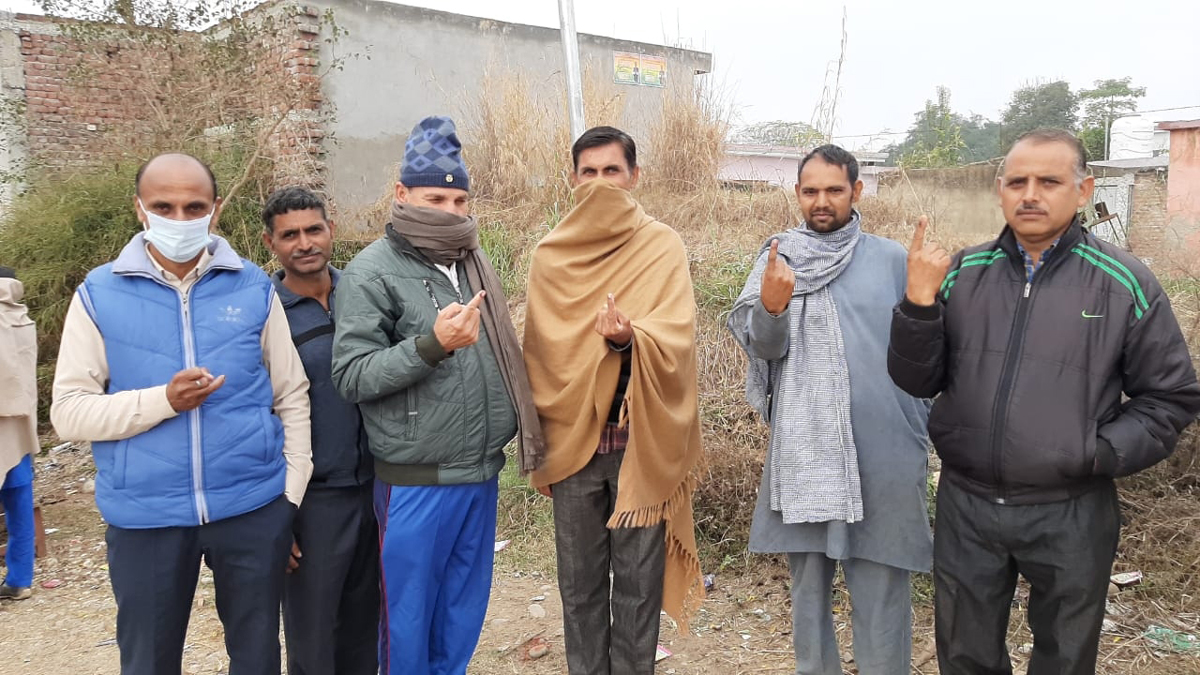
Avtar Bhat
KATHUA, Dec 13: Undeterred by overnight shelling in neighboring Pansar village in Hiranagar, tehsil of Kathua district, cold weather and dense fog , the people in border belt of Hiranagar District Development Council (DDC) constituency came in large numbers from early in the morning to cast their vote for strengthening the three -tier democratic set up in the UT of Jammu and Kashmir in the 6th phase of polling today.
The heavy rush of voters was seen on the polling booths near Zero Line of International Border in Hiranagar including Bobiya, Ladwal, Karole, Londi, Patti and Panjgrian which are hardly at a distance from 500 meters to one km from IB. Though the roar of overnight shelling and firing was echoing in their ears this morning too, the denizens of the border area not caring for their lives and braving dense fog and biting cold of the morning showed their commitment to strengthen the three-tier Panchayati Raj system in the UT for which the exercise was made for the first time in last seven decades.
The authorities had, however, made elaborate security arrangements especially on the polling booths near Zero Line where besides local police and CRPF jawans, the BSF men were manning the polling booths by standing on their roof tops to avert any untoward incident.
At some polling stations, voters had reached even before 7 am to cast their vote as early as possible. However, the old and infirm people came to cast their vote after 10 am. Long queues of voters were seen at various polling booths in Hiranagar and Barnoti in Kathua district, as well as Ramgarh and Rajpura constituencies in Samba district.
There was such an enthusiasm in both border belts of Kathua and Samba districts as well as Kandi areas that nonagenarians, octogenarians and septuagenarians besides the specially abled persons also were seen in large numbers in front of polling booths at various places to cast their vote. While some specially abled persons had come on their wheelchairs, the old and infirm people had reached their respective polling booths with the help of their children and relatives as they did not want to miss the opportunity to cast their vote for strengthening the democratic system of the country.
Rajinder Kumar, an old person who had come to cast his vote in Sherpur Polling Booth in Hiranagar constituency said that people in this border belt could not sleep for last night due to shelling in Pansar area of IB from across the border.
“The overnight gun firing and shelling is still echoing in our ears but this did not dampen our spirits to cast the vote as these elections are aimed at strengthening the democratic structure at grass root level”, he added.
He, while complimenting the Government for taking a bold initiative in conducting the elections to three tier democratic institutions in the J&K where the people were deprived of the same for last seven decades expressed the hope that this step will usher in the development of Rural J&K especially the border belts where people are facing multiple problems due to cross border shelling.
Supporting him, Ram Kumar, another local voter demanded that special reservation be given to border youth in belt force and Army and reservation for IB be also increased as the border youth are dependent on Government jobs because there is neither industrial set up in border areas nor the private sector. The agriculture being the only source of livelihood is also affected due to cross border firing, he added.
Some people in this border belt, however, were highly praise of the Government for constructing the bunkers saying that after their construction the migration due to cross border shelling has stopped to great extent. “The migration from the area has stopped since the construction of bunkers”, said Tirath Singh of village Bobiya. However, he demanded modernized facilities in bunkers like toilets, electricity and drinking water.
The first time voter Awantika at Panjgrain border village after casting her vote said she is overwhelmed over casting her vote for the first time and taking part in the democratic process of the country. She said that the youth are future of country but the border students and youth are facing problems as they can’t take advantage of the latest technology for studies because the connectivity in the border belt is poor. She expressed the hope that new DDC members will look into this problem and take the issue of opening specially managed schools in border belt where there would be proper internet facilities for the children.
The people were so eager to participate in the elections in two DDC constituencies of Kathua and Samba districts that those working at Jammu and some parts of Punjab had taken special leave to reach their native places to cast their vote.
In Barnoti block of Kathua district, a 87 year old lady Kamla Devi came on wheel chair to cast her vote at Budi Polling Booth. Roshan Lal, another voter of the area said that since the process of strengthening three tier democracy was started by the Government this Kandi area saw some development. He, while highlighting the benefits of holding DDC elections, said it was difficult for people earlier to contact the MLA who has a vast area but now they can meet DDC members easily and highlight their problems for redressal.
Likewise, heavy rush of voters was seen in front of polling booths in Ramgarh and Rajpura constituencies in Samba district . The authorities had made all arrangements on polling booths including sanitization, social distancing and thermo checking.
In various polling booths in Rajpura, long queues of women voters were seen who were patiently waiting for their turn to cast their vote. Bimla Devi, a 85 year old lady had reached to polling booth Higher Secondary School Rajpura with the support of her children to cast the vote.

